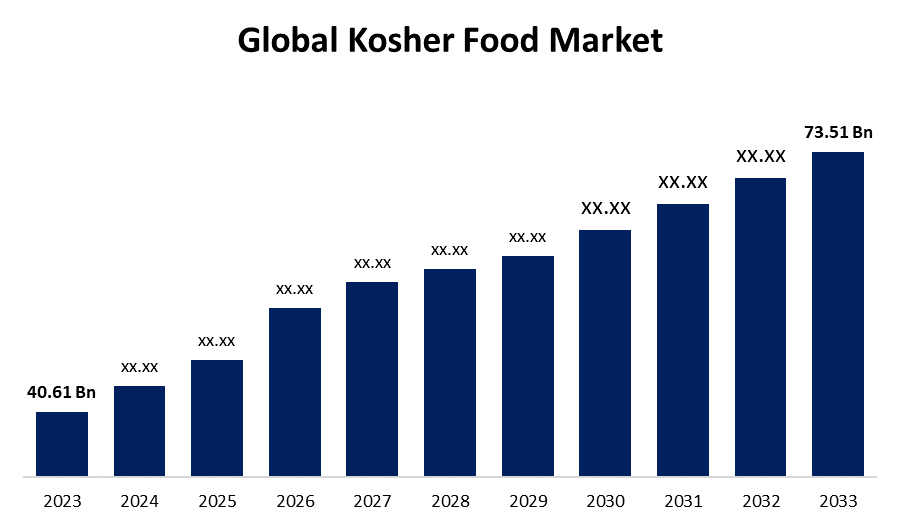Global Kosher Food Market Size, Share, and COVID-19 Impact Analysis, By Type (Pareve, Seafood, Lamb, and Others), By Application (Culinary Products, Snacks and Savory, Bakery and Confectionery Products, Meat, Beverages, and Dietary Supplements), By Distribution Channel (Supermarkets and Hypermarkets, Grocery Stores, and Online Stores), and By Region (North America, Europe, Asia-Pacific, Latin America, Middle East, and Africa), Analysis and Forecast 2023 - 2033
Industry: Food & BeveragesGlobal Kosher Food Market Insights Forecasts to 2033
- The Global Kosher Food Market Size was Valued at USD 40.61 Billion in 2023
- The Market Size is Growing at a CAGR of 6.11% from 2023 to 2033
- The Worldwide Kosher Food Market Size is Expected to Reach USD 73.51 Billion by 2033
- Asia Pacific is Expected to Grow the fastest during the forecast period.

Get more details on this report -
The Global Kosher Food Market Size is Anticipated to Exceed USD 73.51 Billion by 2033, Growing at a CAGR of 6.11% from 2023 to 2033.
Market Overview
Kosher foods are those that conform to the regulations of "kashrut," or Jewish dietary law, and must undergo various special treatments. Food that can be consumed according to "halakha," Jewish law, is termed kosher in English, derived from the Ashkenazi pronunciation of the Hebrew term "kashér," meaning "fit." Conversely, food that does not meet Jewish law is known as "treif," meaning "torn." Many foods, dishes, and beverages hold significant importance in various religions. One of the latest food trends is the vigorous increase in demand for kosher-certified products. To meet this growing demand, numerous supermarkets and food companies worldwide offer a wide variety of kosher products, such as juices, pasta, cereals, bread, and more. The increasing popularity of kosher food will require more products and businesses to obtain certification. As this food trend grows, producers must stay current by securing the necessary certification to capitalize on this shift in consumer dietary preferences. Those who do will reap long-term benefits, as this appears to be a growing trend.
Report Coverage
This research report categorizes the market for the global kosher food market based on various segments and regions forecasts revenue growth and analyzes trends in each submarket. The report analyses the key growth drivers, opportunities, and challenges influencing the global kosher food market. Recent market developments and competitive strategies such as expansion, product launch, and development, partnership, merger, and acquisition have been included to draw the competitive landscape in the market. The report strategically identifies and profiles the key market players and analyses their core competencies in each sub-segment of the global kosher food market.
Driving Factors
Continual innovation in kosher-certified products, featuring alternative ingredients, flavors, and cuisines, is driving market growth by appealing to diverse consumer tastes. Companies are creating kosher-certified plant-based meat alternatives to cater to health-conscious and environmentally aware consumers. Furthermore, the launch of kosher-certified exotic spices and globally-inspired dishes appeals to adventurous eaters, broadening the market beyond traditional offerings and drawing in new consumers. The inclusivity of kosher-certified products, accommodating diverse dietary requirements, is also a key growth driver. Kosher options assure ingredient purity for those with allergies, and the rising demand for plant-based diets aligns with kosher principles, further broadening the market. This convergence of dietary needs underscores the appeal of kosher food to a wide range of health-conscious consumers, fostering market expansion.
Restraining Factors
Producing kosher-certified food often incurs higher costs due to stringent requirements, leading to higher prices that might deter budget-conscious consumers, limiting market reach. Additionally, the complex and costly certification process discourages many manufacturers, reducing the availability of kosher options in the market.
Market Segmentation
The global kosher food market share is classified into type, application, and distribution channel.
- The pareve segment is expected to hold the largest share of the global kosher food market during the forecast period.
Based on the type, the global kosher food market is categorized into pareve, seafood, lamb, and others. Among these, the pareve segment is expected to hold the largest share of the global kosher food market during the forecast period. The adoption of kosher pareve-certified products is gaining popularity, contributing significantly to segment growth. This trend is driven by individuals seeking versatile food options that meet dietary restrictions. Additionally, there is an increasing demand for high-quality natural food products that offer gluten-free options, which is further expected to boost the demand for kosher foods. Consumers are becoming more health-conscious and are looking for products that align with their dietary needs while ensuring quality and compliance with kosher standards. As a result, the market for kosher foods is anticipated to expand, attracting a broader range of consumers who prioritize both health and dietary inclusivity.
- The meat segment is expected to grow at the fastest CAGR during the forecast period.
Based on the application, the global kosher food market is categorized into culinary products, snacks and savory, bakery and confectionery products, meat, beverages, and dietary supplements. Among these, the meat segment is expected to grow at the fastest CAGR during the forecast period. Meat has become a key growth driver in the kosher food market due to its cultural, religious, and culinary importance. The meticulous kosher slaughtering process, known as shechita, assures consumers of its adherence to Jewish dietary laws, increasing its appeal among observant Jews. Furthermore, meat plays a central role in traditional Jewish meals and festivals, maintaining a steady demand.
- The supermarkets and hypermarkets segment is expected to grow at the fastest CAGR during the forecast period.
Based on the distribution channel, the global kosher food market is categorized into supermarkets and hypermarkets, grocery stores, and online stores. Among these, the supermarkets and hypermarkets segment is expected to grow at the fastest CAGR during the forecast period. Supermarkets and hypermarkets are pivotal in driving the growth of the kosher food market. Their wide reach, varied product offerings, and convenience have greatly enhanced the accessibility of kosher products to a broader consumer audience. With a global presence, these retailers ensure that kosher products reach both local and international markets, meeting the needs of Jewish communities worldwide. The convenience of one-stop shopping, along with a variety of kosher options, allows consumers to easily incorporate kosher choices into their regular shopping routines.
Regional Segment Analysis of the Global Kosher Food Market
- North America (U.S., Canada, Mexico)
- Europe (Germany, France, U.K., Italy, Spain, Rest of Europe)
- Asia-Pacific (China, Japan, India, Rest of APAC)
- South America (Brazil and the Rest of South America)
- The Middle East and Africa (UAE, South Africa, Rest of MEA)
North America is projected to hold the largest share of the global kosher food market over the forecast period.

Get more details on this report -
North America is projected to hold the largest share of the global kosher food market over the forecast period. North America is playing a crucial role in driving market growth, fueled by its diverse population, including a sizable Jewish community that supports the demand for kosher food, reflecting both dietary and cultural preferences. The availability of kosher-certified products in mainstream supermarkets and specialty stores throughout the continent has enhanced accessibility for Jewish and non-Jewish consumers alike, broadening the market's scope. Additionally, the proactive efforts of food manufacturers and producers to obtain kosher certifications are contributing positively to the outlook of the kosher food market in the region.
Asia Pacific is expected to grow at the fastest CAGR growth of the global kosher food market during the forecast period. In the Asia-Pacific region, there is anticipated significant growth in the demand for a diverse range of kosher food and products that comply with kashrut law in the foreseeable future. This growth is notably driven by the increasing presence of millennials, who are increasingly embracing kosher cuisine due to its perceived health benefits, ethical considerations, and alignment with their culinary preferences. As this demographic expands, their interest in kosher foods presents promising opportunities for market growth. The rising awareness and availability of kosher-certified options in the region's food markets are expected to further fuel this trend, catering not only to Jewish communities but also to a broader audience seeking diverse and culturally aligned food choices.
Competitive Analysis:
The report offers the appropriate analysis of the key organizations/companies involved within the global kosher food market along with a comparative evaluation primarily based on their product offering, business overviews, geographic presence, enterprise strategies, segment market share, and SWOT analysis. The report also provides an elaborative analysis focusing on the current news and developments of the companies, which includes product development, innovations, joint ventures, partnerships, mergers & acquisitions, strategic alliances, and others. This allows for the evaluation of the overall competition within the market.
List of Key Companies
- Nestlé S.A.
- ConAgra Foods, Inc.
- General Mills, Inc.
- PepsiCo, Inc.
- Kellogg Company
- The Kraft Heinz Company
- Tyson Foods, Inc.
- Mars, Incorporated
- Unilever PLC
- Hormel Foods Corporation
- The Hershey Company
- Coca-Cola Company
- Archer Daniels Midland Company
- Cargill, Incorporated
- Danone S.A.
- Manischewitz Company
- Hain Celestial Group, Inc.
- Eden Foods, Inc.
- Kosher Valley, LLC
- Kayco
- Others
Key Market Developments
- In March 2022, Prairie Street Prime now offers kosher meat delivery, expanding its service beyond areas such as Palm Beach, New York City, and Beverly Hills, California, where it already delivers premium kosher beef.
Key Target Audience
- Market Players
- Investors
- End-users
- Government Authorities
- Consulting And Research Firm
- Venture capitalists
- Value-Added Resellers (VARs)
Market Segment
This study forecasts revenue at global, regional, and country levels from 2020 to 2033. Spherical Insights has segmented the global kosher food market based on the below-mentioned segments:
Global Kosher Food Market, By Type
- Pareve
- Seafood
- Lamb
- Others
Global Kosher Food Market, By Application
- Culinary Products
- Snacks and Savory
- Bakery and Confectionery Products
- Meat
- Beverages
- Dietary Supplements
Global Kosher Food Market, By Distribution Channel
- Supermarkets and Hypermarkets
- Grocery Stores
- Online Stores
Global Kosher Food Market, By Regional
- North America
- US
- Canada
- Mexico
- Europe
- Germany
- UK
- France
- Italy
- Spain
- Russia
- Rest of Europe
- Asia Pacific
- China
- Japan
- India
- South Korea
- Australia
- Rest of Asia Pacific
- South America
- Brazil
- Argentina
- Rest of South America
- Middle East & Africa
- UAE
- Saudi Arabia
- Qatar
- South Africa
- Rest of the Middle East & Africa
Frequently Asked Questions (FAQ)
-
1. What is the CAGR of the global kosher food market over the forecast period?The Global Kosher Food Market Size is Expected to Grow from USD 40.61 Billion in 2023 to USD 73.51 Billion by 2033, at a CAGR of 6.11% during the forecast period 2023-2033.
-
2. Which region is expected to hold the highest share in the global kosher food market?North America is projected to hold the largest share of the global kosher food market over the forecast period.
-
3. Who are the top key players in the kosher food market?The top key players in the global kosher food market are Nestlé S.A, ConAgra Foods, Inc., General Mills, Inc., PepsiCo, Inc., Kellogg Company, The Kraft Heinz Company, Tyson Foods, Inc., Mars, Incorporated, Unilever PLC, Hormel Foods Corporation, The Hershey Company, Coca-Cola Company, Archer Daniels Midland Company, Cargill, Incorporated, Danone S.A., Manischewitz Company, Hain Celestial Group, Inc., Eden Foods, Inc., Kosher Valley, LLC, Kayco, Others.
Need help to buy this report?